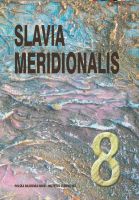Култът към св. Кирил и Методий през Българското средновековие.Идеологически параметри и литературни рефлекси
The Bulgarian Mediaeval cult of Cyril and Methodius: ideological parameters and literary reflections
Author(s): Ana StojkovaSubject(s): Cultural history
Published by: Instytut Slawistyki Polskiej Akademii Nauk
Summary/Abstract: The paper explores the development of the cult of the Slavic Apostles from its emergence in the second half of the 9th century up to the end of the 14th century and the way these changes reflected in literary production. At the time of the First Bulgarian Kingdom the commemoration of Cyril and Methodius was imposed by the state but at the same time they were perceived as “teachers of all the Slavs”. When Bulgaria lost its state independence in the 11th and the 12th centuries, the saints were perceived in literary works as Bulgarian enlighteners and they became a key symbol of Bulgarian ethnic identity. Their cult remained important for the state and the church in the beginning of the Second Bulgarian Kingdom, in the early 13th century, when Cyril and Methodius’ personalities as well as their works were considered exclusively connected with the Bulgarian people and language. Soon afterwards their church commemoration began to lose its intensity as a consequence of social and political changes in the Balkans. The introduction of new liturgical rules and the adoption of Hesychasm into the 14th century religious mainstream provoked the further dislocation of the cult to the periphery of the Bulgarian saint pantheon.
Journal: Slavia Meridionalis
- Issue Year: 2008
- Issue No: 08
- Page Range: 309-326
- Page Count: 18
- Language: Bulgarian

